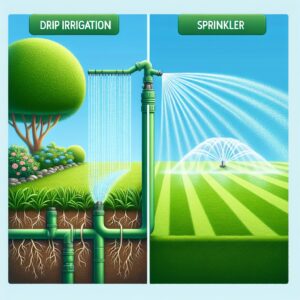
Key Takeaways
-
Lithium-ion batteries are energy-efficient and have a high storage capacity, ideal for residential solar irrigation systems.
-
Lead-acid batteries are cost-effective and reliable, suitable for off-grid solar irrigation setups.
-
Flow batteries, while less common, offer unique benefits for large-scale energy storage needs.
-
When choosing a battery for your solar irrigation system, consider factors such as capacity, lifecycle cost, and the specific needs of your irrigation requirements.
-
Maintenance is crucial for the longevity of your solar irrigation system’s battery, involving routine checks and understanding common issues.
Exploring Battery Options for Solar Irrigation Systems
When you’re harnessing the sun’s power to manage your irrigation needs, the heart of your system isn’t just the solar panels—it’s the batteries. These are the silent workhorses storing energy for when the sun’s not shining. Your choice of battery will affect not just the efficiency and running costs of your system, but also its reliability and longevity.
Lithium-Ion Batteries: The Energy-Efficient Choice
If you’re after top-tier performance, lithium-ion batteries are the go-to. They pack a punch in energy efficiency and storage capacity, which means your solar irrigation system can run longer on the energy stored during sunny days. These batteries also have a longer lifespan compared to others, which means less frequent replacements.
Here’s why they’re great for solar irrigation:
-
High energy density: They can store more energy in a smaller footprint, which is ideal when space is at a premium.
-
Low maintenance: Unlike other battery types, they don’t require water top-ups or regular equalization charges.
-
Depth of discharge (DoD): They can be used to a greater extent of their capacity without damaging them, so you get more usable energy.
However, they do come with a higher upfront cost. But, when you factor in their longer lifespan and better performance, they often offer better value over time.
Lead-Acid Batteries: Affordable and Reliable
Lead-acid batteries have been the backbone of off-grid energy systems for decades. They’re tried and true, and for many, their lower upfront cost makes them an attractive option for solar irrigation systems.
Here’s what makes them a solid choice:
-
Cost-effective: They’re generally cheaper per unit of storage capacity than lithium-ion batteries.
-
Reliability: With proper maintenance, they can be quite dependable.
-
Recyclability: Lead-acid batteries are widely recycled, which is good for the environment.
But, they’re bulkier, have a lower energy density, and require more maintenance. They also have a shorter lifespan and a lower DoD, which means you’ll need to replace them more often.
Flow Batteries: The Future of Large Scale Energy Storage?
Flow batteries are less common in residential setups but have potential for larger solar irrigation systems. They work by pumping electrolyte liquids across a membrane, and the energy is stored in these liquids.
Their advantages include:
-
Scalability: Their capacity can be increased simply by adding more electrolyte.
-
Longevity: They have a very long operational life, often exceeding 20 years.
-
Stability: They can be left fully discharged without harm, which is not the case for most other batteries.
Flow batteries are still an emerging technology, and their initial cost and complexity may be prohibitive for smaller systems.
Sodium-Sulfur Batteries: High Energy Density for Large Operations
For those with hefty power needs, sodium-sulfur batteries are an option worth considering. They operate at high temperatures and can store a lot of energy in a relatively small space.
However, due to their high operating temperature and the corrosive nature of the materials involved, they are typically only used in large industrial applications. They’re not commonly found in residential solar irrigation systems, but they’re a testament to the diversity of battery technology available today.

Picking the Right Battery for Your Solar Irrigation System
Selecting the right battery for your solar irrigation system is a crucial step in setting up a successful and efficient system. Solar irrigation systems rely on batteries to store the energy collected from the sun during the day and use it to power the irrigation system at night or on cloudy days. Therefore, choosing the right battery is essential in ensuring a continuous and reliable water supply for your crops.
Considerations in Battery Selection
When it comes to choosing the right battery for your solar irrigation system, there are several important considerations to keep in mind. The first and most crucial factor is the battery’s capacity. Another important consideration is the battery type. The location and climate of your irrigation system also play a significant role in choosing the right battery. This table below will show things you should consider when selection a Battery.
|
Consideration |
Description |
|---|---|
|
Solar Panel and Battery Sizing | Determine the number of solar panels and batteries needed based on the specific requirements of the irrigation system, such as the average solar irradiance for the location and the power consumption of the system |
|
Off-Grid or On-Grid System | Decide whether the irrigation system will be off-grid or on-grid, as this will impact the type and size of the solar battery and solar power system required |
|
Solar Charge Controller | Select a solar charge controller to regulate the flow of current to and from the battery, protecting it and providing self-diagnostics and electronic error protection |
|
Compatibility with Irrigation Controllers | Ensure that the solar battery is compatible with the irrigation controller system being used |
|
Power Consumption of the Irrigation System | Calculate the power consumption of the irrigation system to determine the capacity of the solar battery needed to support it effectively |
Matching Battery Capacity to Irrigation Requirements
When setting up a solar irrigation system, it’s critical to match the battery’s capacity to your irrigation requirements. This ensures that your system won’t fall short on power when it’s needed most. To determine the right capacity, you’ll need to calculate the total energy consumption of your irrigation system. Then, select a battery with a capacity that exceeds this amount, factoring in days of autonomy to cover periods without sunshine.
Assessing Battery Lifecycle Costs
Beyond the initial purchase price, you should consider the total lifecycle cost of your solar irrigation system’s battery. This includes factors like lifespan, efficiency, maintenance, and replacement costs. Lithium-ion batteries may have a higher upfront cost, but their longer life and lower maintenance can make them more cost-effective in the long run. On the other hand, lead-acid batteries might be cheaper initially, but their shorter lifespan and higher maintenance needs could result in greater costs over time.
Installation Insights: Getting Your System Up and Running
Proper installation is key to the performance and longevity of your solar irrigation system. Whether you opt for a professional installation or take the DIY route, it’s important to understand the process and ensure that your system is set up correctly from the start.
Professional Installation vs. DIY
Professional installation by a certified technician can provide peace of mind and ensure that your system is optimized for efficiency and safety. However, if you’re handy and have a good understanding of electrical systems, a DIY installation can save on costs. Just be sure to follow all manufacturer guidelines and local regulations.
Understanding the Setup Process
The setup process involves mounting the solar panels, connecting them to the batteries and irrigation controller, and ensuring everything is properly wired and insulated. It’s crucial to place panels where they will receive maximum sunlight and to use the correct gauge of wiring to minimize energy loss.

Maintaining Your Solar Irrigation System Battery
Maintenance is crucial for the longevity and efficiency of your solar irrigation system’s battery. Regular checks and balancing can help detect issues early and keep the system running smoothly.
Routine Checks and Balancing
Conduct routine inspections to ensure connections are tight and corrosion-free. For lead-acid batteries, check water levels and perform equalization charges as needed. For all battery types, monitor charge levels and avoid deep discharges to prolong battery life.
Balance your battery bank by ensuring all batteries are of the same type, age, and charge level. This helps to prevent the ‘weakest link’ effect, where the performance of the entire system is dragged down by the poorest-performing battery.
Addressing Common Battery Issues
Common issues with solar irrigation system batteries include undercharging, overcharging, and sulfation in lead-acid batteries. To avoid these problems, use a charge controller that matches your battery type and follow the manufacturer’s charging guidelines. Regular maintenance and monitoring can help prevent these issues from arising.

Future Trends in Solar Irrigation Battery Technology
As technology advances, we’re seeing exciting developments in solar irrigation battery technology. These innovations promise to make systems more efficient, reliable, and affordable.
Emerging Technologies on the Horizon
New battery technologies, such as solid-state batteries, offer the potential for higher energy densities and longer lifespans. Additionally, advancements in integration with smart grid technologies could lead to more intelligent energy management in solar irrigation systems.
Advancements in Energy Storage and Implications for Irrigation
Advancements in energy storage technology, like improved battery management systems, are increasing the efficiency and reliability of solar irrigation systems. These developments not only improve the performance of existing systems but also make solar irrigation more accessible to a broader range of users.
Frequently Asked Questions
Let’s tackle some common questions you might have about batteries in solar irrigation systems. These answers will guide you through some important considerations, helping you make informed decisions for your setup.
Can I Use Multiple Battery Types in My Solar Irrigation System?
It’s generally not recommended to mix battery types within a single solar irrigation system. Different batteries have varying charge and discharge rates, capacities, and maintenance requirements. Mixing them can lead to inefficiencies and might even damage the batteries or reduce their lifespan. Stick with one type to ensure your system runs smoothly.
How Do I Know When to Replace My Solar Irrigation System Battery?
You’ll know it’s time to replace your battery when it no longer holds a charge as well as it used to, or if it’s unable to meet the energy demands of your irrigation system. Keep an eye on your system’s performance and check the battery’s voltage and capacity regularly. Most batteries also have a recommended lifespan, after which they should be replaced.
What is the Most Cost-Effective Battery Option for a Small Solar Irrigation System?
For a small solar irrigation system, lead-acid batteries are often the most cost-effective option due to their lower upfront cost. However, don’t just look at the initial price. Consider the total cost of ownership over the battery’s life, including replacement costs and maintenance. Sometimes, spending a bit more upfront on a lithium-ion battery can save you money in the long run.
Are There Any Subsidies or Incentives for Upgrading to a Better Battery System?
It’s worth looking into local and federal incentives for renewable energy investments. Programs like the Investment Tax Credit (ITC) can offer significant savings when you install a solar battery as part of your renewable energy system. Always check the latest regulations and incentives in your area.
Remember, these incentives can change, so it’s important to do your research or consult with a solar energy expert to ensure you’re getting the most up-to-date information.
Additionally, some states offer specific programs aimed at encouraging the use of renewable energy, which can include grants, rebates, or other financial assistance.
Do Higher Temperatures Affect the Performance of Solar Irrigation System Batteries?
Yes, extreme temperatures can affect battery performance and lifespan. High temperatures can lead to increased discharge rates and can even cause damage to the battery cells. On the flip side, cold temperatures can reduce the battery’s capacity and slow down chemical reactions within the battery. It’s important to install your batteries in a location where they can remain within their recommended temperature range.
To mitigate temperature effects, ensure your battery storage area is insulated and, if necessary, climate-controlled. This will help maintain battery efficiency and prolong its life.
Conclusion: Which of the Batteries for a Solar Irrigation System is the Best?
Choosing the right battery for your solar irrigation system comes down to understanding your specific needs and balancing factors like cost, efficiency, and maintenance. Lithium-ion batteries are often the best choice for those looking for long-term savings and reliability, while lead-acid batteries might be suitable for those with tighter budgets or simpler systems.
Remember, your battery is the backbone of your solar irrigation system. Investing in the right one will ensure that your crops are watered reliably, and your system runs smoothly for years to come. With the right setup and maintenance, you can achieve a sustainable and efficient irrigation system that harnesses the power of the sun to its fullest potential.






